|
|
|
Sort Order |
|
|
|
Items / Page
|
|
|
|
|
|
|
| Srl | Item |
| 1 |
ID:
132471
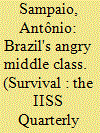

|
|
|
|
|
| Publication |
2014.
|
| Summary/Abstract |
The recent protests show that secure democracy and an absence of extremism are no guarantee of domestic stability.
On 26 May 2014, just a few weeks ahead of the World Cup, an angry crowd surrounded the Brazilian football team in Rio de Janeiro. Striking teachers attacked the team bus as it left the city's international airport, protesting the government's vast expenditure on preparations for the event and neglect of the education system. Heavily armed military police were called in to clear a path for the vehicle, and have followed the players ever since. For many Brazilians, passion for football was supplanted by demands for better infrastructure, salaries and quality of life: the 12 June Brazil-Croatia game that opened the tournament followed a year in which one person was killed and hundreds were estimated to have been injured in demonstrations around the country. This article went to press before the four-week-long competition had finished; football mania was at the time returning to Brazil. The country's mood was likely to be affected by the final result.
|
|
|
|
|
|
|
|
|
|
|
|
|
|
|
|
| 2 |
ID:
119739
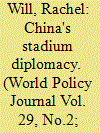

|
|
|
|
|
| Publication |
2012.
|
| Summary/Abstract |
Ten minutes drive from the coastal Angolan city of Benguela, on the edge of what was once an abandoned banana plantation, a massive white steel structure emerges from the surrounding shanties and barren fields. Only a single paved road runs alongside it. Benguela's stadium is one of four built for the 2010 African Cup of Nations, an event designed to showcase Angola's charge toward modernity. The event resembles, on a somewhat reduced scale, the World Cup. But with the barriers Angola needed to hurdle to prepare for its hosting duties, the event may as well have been the Olympics. Only 10 years after a 27-year civil war, much of Angola's national infrastructure remained shattered, with land mines marking conflict zones across its landscape.
|
|
|
|
|
|
|
|
|
|
|
|
|
|
|
|
| 3 |
ID:
131279


|
|
|
| 4 |
ID:
129626


|
|
|
| 5 |
ID:
105408
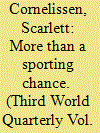

|
|
|
|
|
| Publication |
2011.
|
| Summary/Abstract |
This article appraises the sport for development initiatives that were implemented or augmented during the 2010 fifa World Cup hosted in South Africa, and reviews the processes, institutional features and likely consequences of those initiatives for the sport for development sector in the country. It does so against the background that sport for development is a growth industry, albeit one with many conceptual and operational deficiencies, and which offers little in the way of an evidentiary base for the claim that sport has intrinsic social benefits. To date, too, there has been little cross-fertilisation between the sport for development field as a practice of development, and the growing body of scholarship that assesses the development impacts of large-scale sporting events. Given its distinctive setting and the intense international interest in its potential yields, the 2010 World Cup provoked a flurry of sport-centred development programmes implemented by a variety of international, domestic, public and private actors. This stimulated an interesting change in dynamics in the established sport for development landscape which, in time, may shape the sector and the broader sports environment in the country in both positive and negative ways. The case of the World Cup also offers some insights about the way in which sport for development practices can be mediated or altered in the context of sport mega-events.
|
|
|
|
|
|
|
|
|
|
|
|
|
|
|
|
| 6 |
ID:
131281
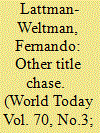

|
|
|
| 7 |
ID:
106630
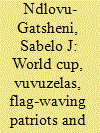

|
|
|
|
|
| Publication |
2011.
|
| Summary/Abstract |
The recent hosting of the World Cup by South Africa invoked what Michael Billig has termed 'banal nationalism', manifesting itself through blowing of 'Vuvuzelas', waving and displaying of the national flag on vehicles, as well as the wearing of sports regalia (Football Friday) by the people across racial, ethnic and class divisions. The support for the national team-'Bafana Bafana' occupied the national centre stage and became the main symbol around which national pride and unity crystallised. How long will this national unity survive the event? Is South Africa experiencing one month of fake nationhood? Is this national unity a sign of triumphalism over divisive nationalisms of the past? This article deploys a combination of Billig's concept of banal nationalism, Foucaldian discourse analysis and a historical approach to examine how South African nationalists used the World Cup to enhance the project of nation building. The article analyses the various debates about the nation provoked by the hosting of the World Cup, particularly how the mega-event spawned a strong spirit of national unity on the one hand, while simultaneously bringing into sharp focus glaring class divisions and threats of xenophobia, on the other. It brings together the views of left-leaning dissenters, Afro-pessimists and nationalist optimists on the impact and meaning of the World Cup for South Africa. Its key hypothesis is that these competing perspectives cannot be understood without acknowledging the local context of a society emerging from apartheid oppression and racism, existing within a global terrain that is provoking contradictory notions of belonging and being an aspirant nation with a weak sense of nationhood.
|
|
|
|
|
|
|
|
|
|
|
|
|
|
|
|
|
|
|
|
|